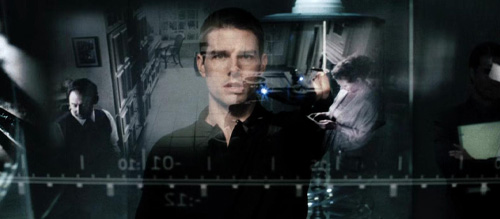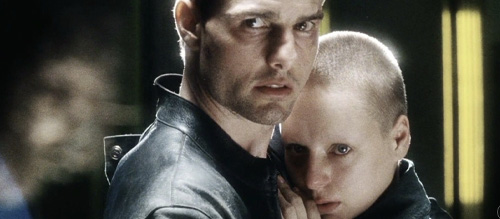‘Minority Report’ at 20 – Review
This article was originally published to SSP Thinks Film by Sam Sewell-Peterson.

Minority Report (2002)
Director: Steven Spielberg
Screenwriters: Scott Frank, Jon Cohen
Starring: Tom Cruise, Colin Farrell, Samantha Morton, Max von Sydow, Steve Harris, Neal McDonough, Kathryn Morris, Lois Smith, Peter Stormare, Tim Blake Nelson
Far more than just another Tom Cruise running and jumping movie (though he still does plenty of both in this) Minority Report is pretty deceptive as a blockbuster. As one of Steven Spielberg’s (relatively speaking) under-appreciated directorial efforts, now celebrating its 20th anniversary, what better time is there to give this ground-breaking Philip K. Dick adaptation one more shot? “I’m sorry John, but you’re gonna have to run again…”
Washington DC, the year 2054. The PreCrime Initiative which predicts crimes of passion and apprehends perpetrators before they can cause harm, is a daily reality. Exploiting the gifts of a trio of psychic “Precogs”, the DC Police Department have virtually eradicated violent crime in their city and are preparing to roll out the programme across the country. The system works, every time. But everything changes when Chief John Anderton (Tom Cruise) is named as a future murderer of a man he has never met.
Delayed multiple times due to scheduling conflicts and passed from director to director for years, what started being pitched out as a sequel to another film adaptation of a Philip K. Dick short story (the Arnold Schwarzenegger-starring Total Recall) eventually landed with director Steven Spielberg who was attracted to the story being “50 percent character and 50 percent very complicated storytelling with layers and layers of murder mystery and plot.”
The rules of this world 50 years in the future are quickly and elegantly established, not through over-explanation in Scott Frank and Jon Cohen’s lean script but primarily through clean visual storytelling. We witness Anderton’s daily routine play out and get a quick sense of what is different about this world and what is the same. Even the exposition that brings Colin Farrell’s Danny Witwer up to speed when he first arrives at PreCrime serves the purpose of planting all the relevant details to solving this mystery in the back of the viewer’s mind and sets up Witwer and Anderton being manipulated, their ironclad laws bent and broken as the plot thickens.
The way the Precog vision is realised is an incredibly effective visual; cold, distant and eerie. It is also intentionally limited, focussed enough that the viewer’s mind (as well as the psychic dreamer’s) tends to focus only on the details the storyteller (whether that be Spielberg or the film’s big bad) wants you to see, allowing for the rug to be pulled out from under you, and Anderton, multiple times.
It’s amazing how close this film got to predicting near-future technological developments. A lot of these ideas may have been well on their way in the early 2000s, but it would be amusing to find out how many concept/development meetings at the big tech firms ended with “I love it, but make it more like Minority Report”. Motion controls, VR, HUDs, personalised advertising, widespread retina and facial recognition software – the gang’s all here!
Much like with Blade Runner, the film adapts the core premise of Philip K. Dick’s 1956 short story and freely expands on it in order to create a grotesque mirror of the American Justice System. It packs an even bigger punch now, because you know plenty of people would vote for pre-emptively incarcerating potential murderers if it was an option. “The fact that you prevented it happening doesn’t change the fact that it was going to happen”.

This is among Spielberg’s most philosophical films as well, being all about fate or lack thereof. It plays with this concept throughout, from the horrific implications of the flaw in the “perfect” system and the fact that, in theory, nobody can act spontaneously (“Put the gun down John, I don’t hear a red ball!”). Anderton’s son Sean’s unsolved disappearance is a tragic failure which grounds his experiences and leaves his life without much meaning; the only real closure he ever gets is hearing a “what if?” story from Precog Agatha (a haunting Samantha Morton).
Of course we follow a grieving, broken father stuck in the past; it is a Spielberg movie, after all. The film also has one of the best jump-scares since the head popping out of the boat in Jaws. He has a lot to answer for in how a lot of modern sci-fi films look too, from many of the same assembly line action scene gags cropping up in Attack of the Clones (filmmaker besties will talk) to JJ Abrams’ shiny, lens-flarey Star Trek reboot that would likely never have turned out the way it did without exactly the same aesthetic being used in Minority Report. The sick-stick and the sonic gun, despite only being used once apiece, make their mark as some of the coolest ever future weapons, and the police spider drones are such a creepy idea. The birds-eye-view of their relentless apartment search for Anderton offers the hilarious sight of a couple stopping their full-blown domestic mid-flow to be scanned before immediately resuming their argument.
Some things seem to exist in the film purely to add a little colour and richness to the world. Just about everyone seems to have a streaming cold, which possibly means something, unless it’s just a genre-appropriate Chinatown reference. Peter Stormare’s mucus-y sinister appearance as a backstreet surgeon/organ harvester (“Nothing quite like taking a shower with this large fella with an attitude you can’t even knock down with a hammer”) strengthens this possible connection by playing his part very much like he’s in a Polanski picture. Spielberg rarely goes this dark in a genre piece.
Did we need the scene where sentient vines attack Cruise to wake the audience up just before a big talky scene? Not really. Should they have thought about how stupid it is that Anderton can get back into PreCrime using his old eyes in a little plastic baggy without setting off any other security measures like facial recognition? Probably. But these are nit-pick queries that can mostly be answered with “because it’s a movie” and don’t threaten to unseat Minority Report as one of the great contemplative and mind-melting mysteries on film.
Score: 22/24

